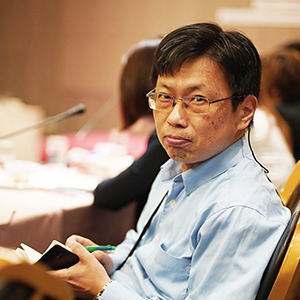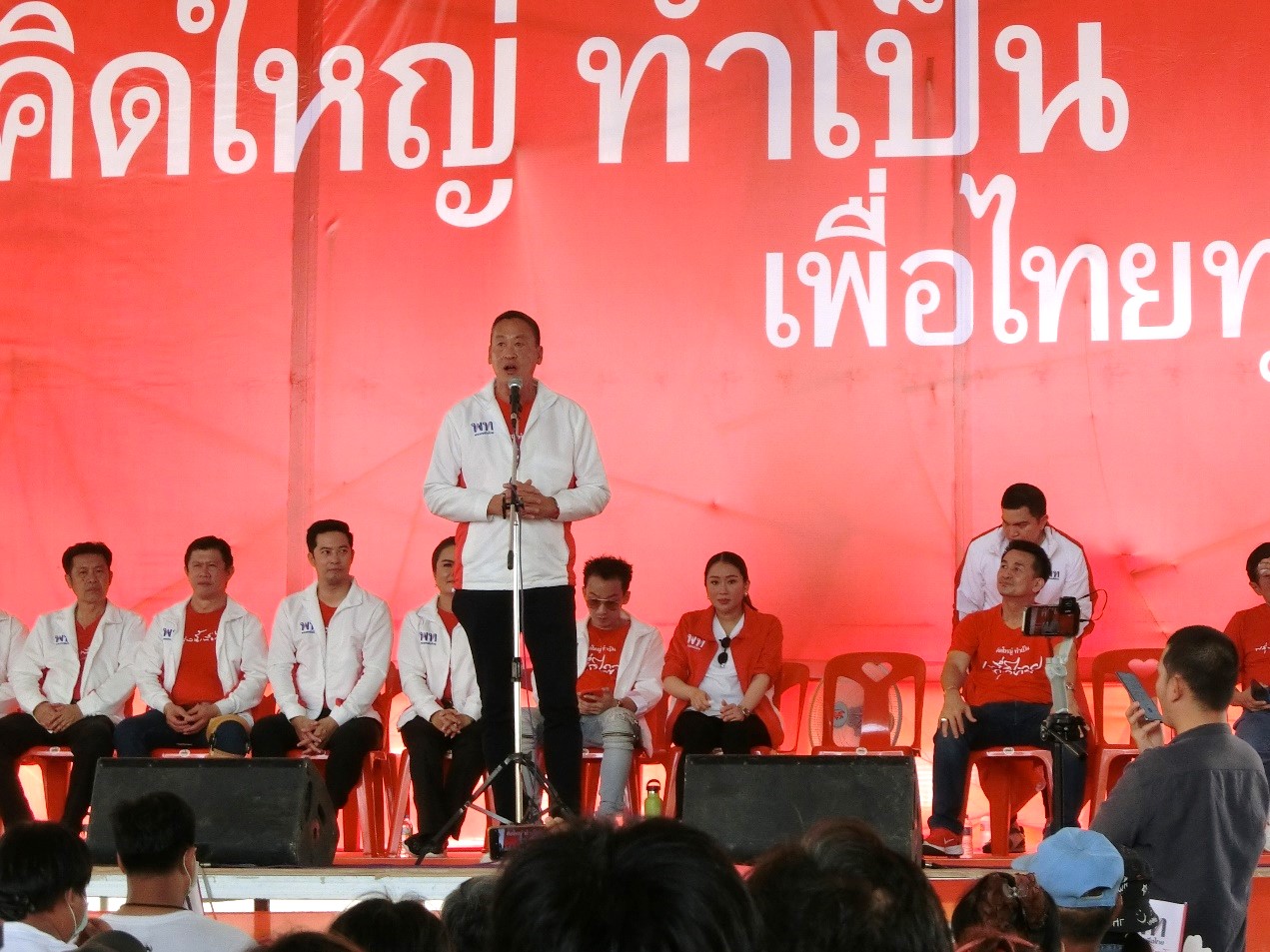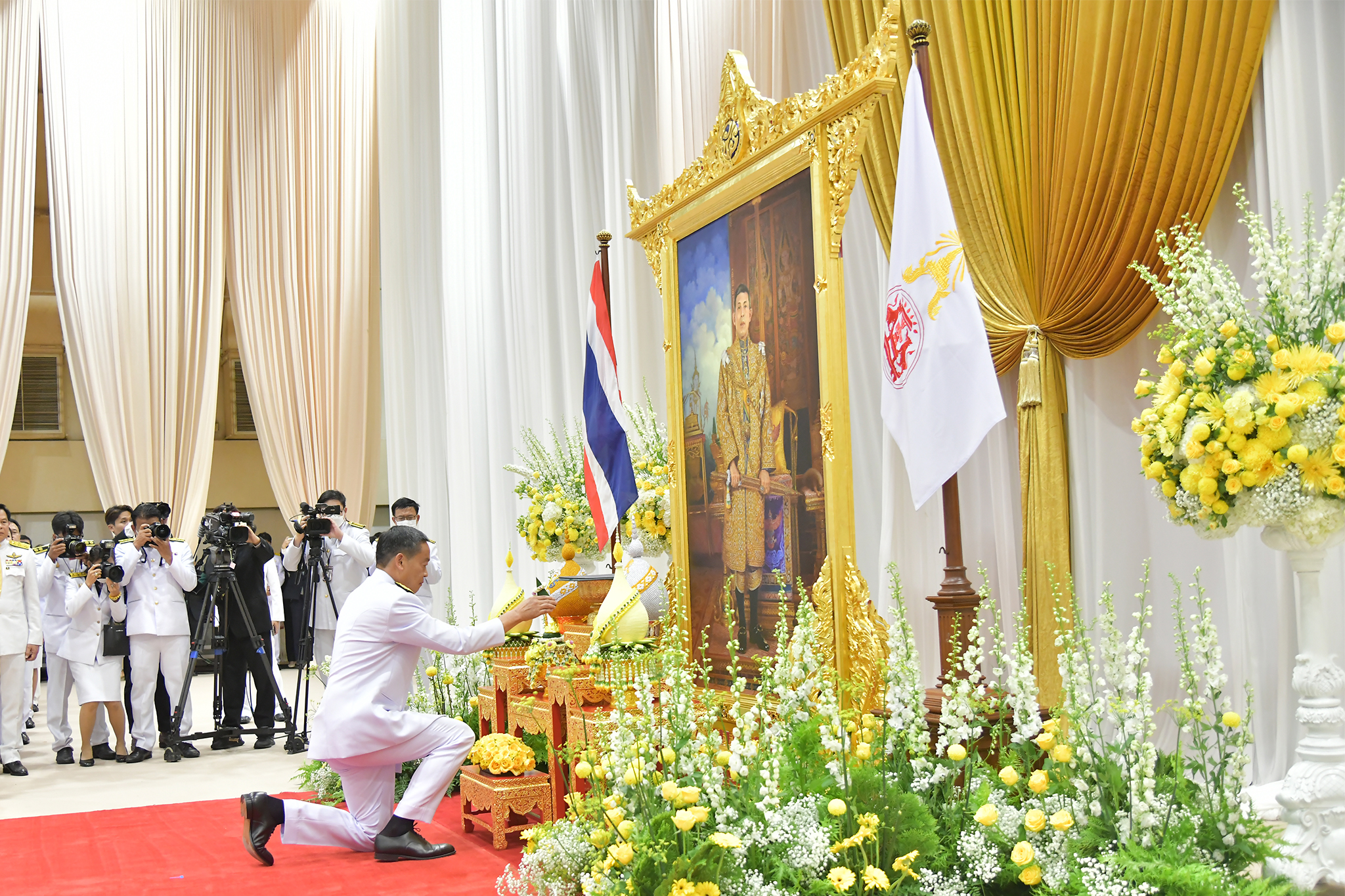Parliament voted in Srettha Thavisin of the Pheu Thai Party as prime minister on August 22, 2023. He visited Phitsanulok province in northern Thailand for the election campaign on March 12. The Pheu Thai Party strongly opposed dictatorship and military coups, advocating for popular sovereignty and democracy. It pledged not to form a coalition government with the former pro-military ruling parties. Picture source: Photo courtesy of the author, March 12, 2023.
Prospects & Perspectives No. 48
Thailand in Times of Electoral Uncertainty
By Katsuyuki Takahashi
Real estate tycoon Srettha Thavisin (Pheu Thai Party) was finally voted in by Parliament as prime minister on August 22, one hundred days after the general election of May 14. The delay in the formation of the new government had worried Thai people, especially in the business sector, as it affected their businesses, the economy, and foreign investment. The King endorsed the new government on September 1.
The Remarkable 2023 General Election
The election results of 500 seats exceeded most expectations. The progressive Move Forward Party (MFP) moved into first place with 151 seats in the second election from 81 seats of its predecessor, the Future Forward Party (FFP), in the 2019 election. Following a complaint by the Election Commission (EC), the Constitutional Court disbanded the FFP in 2020 for borrowing money from its party leader, Thanathorn Juangroongruangkit, beyond the limit, as stipulated in the Political Parties Act. After the FFP dissolved, students and youth held demonstrations calling for the resignation of Prime Minister Prayuth Chan-ocha, who had staged a coup in 2014. They also demanded a new democratic constitution and reforms of the monarchy. Many activists were arrested for lèse-majesté.
The MFP gained voter confidence, especially among youth and residents in urban areas, because of its performance in parliamentary debates as an opposition party, attacking the government over such matters as the murky budget of the royal household and the military, things that were not known publicly before. The MFP presented a timeline of attractive policies in the election campaign, such as the draft of a new constitution, the abolition of military conscription, the direct election of provincial governors, and the retrial of political prisoners, giving people hope of a change from the Royalist military rule.
The pro-Thaksin populist Pheu Thai Party, previously the largest opposition party, secured second place with 141 seats. In the last election, the Pheu Thai Party, which had actually won first place, became the opposition, while the second party, the Palang Pracharath Party (PPRP), took power with the support of the Senate. The Pheu Thai Party had aimed for a landslide victory, setting a target of 310 seats, due to the requirements of the 2017 Constitution. This constitution states that the prime ministerial candidate needs more than 375 votes from the 500 MPs and 250 Senators appointed by the 2014 Coup Group. However, the Pheu Thai Party was defeated by the MFP, many of whose supporters had previously voted for the Pheu Thai Party in the 2019 election, rather than the former ruling parties; such as the Bhumjaithai (71 seats), PPRP (40), United Thai Nation (UTN, 36), and Democrat (25), which slumped as expected.
Dragged Vote on the Premiership
A new government was to be formed at the beginning of August as the EC officially declared the election results on June 19. The leader of the largest party, the MFP, Pita Limjaroenrat, would have become prime minister if Thailand were a fully democratic country. It was thought to be almost impossible for him to become prime minister due to the Thai Establishment’s refusal to accept the MFP’s stance on the monarchy and the military.
The MFP signed a memorandum of understanding (MoU) with seven parties, including the Pheu Thai Party, to form a coalition government, securing 313 votes for the prime minister’s election. The MFP wanted the post of house speaker to ensure the prime minister’s post and fulfill its campaign pledges. However, the Pheu Thai Party also demanded the speaker’s post, so as a compromise, the experienced leader of the small Prachachart Party with nine MPs was elected speaker, the MFP took the first deputy speaker and the Pheu Thai Party took the second deputy speaker on July 5.
The Constitutional Court accepted two cases against Pita and the MFP, respectively, on July 12, the day before the prime ministerial vote. The EC recommended the court remove Pita as an MP for media shareholding. The constitution prohibits electoral candidates from holding stakes in media companies. Another lawyer’s complaint alleged that the MFP’s campaign pledge to amend the lèse-majesté law violated the constitution. Preceding the prime ministerial vote, the Senators and the rival parties pursued the MFP’s position on the lèse-majesté law. As a result, Pita failed to win a majority of votes.
During the debate before the second PM vote on July 19, the Constitutional Court suspended Pita’s parliamentary status to examine his shareholdings in a media company. Additionally, Parliament voted to block Pita’s re-nomination. Under the current constitution, a political party can nominate up to three candidates for prime minister. The MFP only put up a party leader.
Therefore, the second party, the Pheu Thai Party, replaced the MFP and took the initiative in electing the prime minister, consulting with the former ruling parties and asking Senators individually for their support. The Pheu Thai Party broke its pledge and the MoU, dumped the MFP, and teamed up with the royalist conservatives.
The MFP supporters and others launched protests against the Senators, the EC, the Constitutional Court, and the Pheu Thai Party, which blocked the MFP. They demanded the appointment of Pita as prime minister following the result of the election. Protests were still small in scale. However, the silent majority is waiting in the wings.
A prime ministerial candidate, Srettha Thavisin, from the Pheu Thai Party won a PM vote on August 22, after negotiating the allocation of cabinet posts among the coalition parties, including the pro-military PPRP and UTN, which put 2014 coup leaders Prawit Wongsuwon and Prayuth, respectively, as a PM candidate. On the same day, Thaksin Shinawatra, former prime minister and de facto leader of the Pheu Thai, returned to Thailand after 15 years of self-exile. It is alleged that there was a deal between Thaksin and his former foes. The Pheu Thai takes pride in forming a “depolarizing government” with military-backed rivals, despite breaking a pledge, in order to overcome two decades of political conflicts. However, it merely helped the existing conservative forces to survive. Democracy was sacrificed in exchange for Thaksin’s return. Many supporters lost confidence in the Pheu Thai Party.
Prolonged Political Crisis ― Thai Establishment vs. Democracy
Many people are frustrated with the recession, fed up with the military’s political intervention, and demand change. Therefore, they welcomed the victory of the MFP. However, the MFP remains the opposition party. Pita may suffer the same fate as Thanathorn, ex-leader of the dissolved FFP, and be disqualified as an MP. The MFP may be disbanded like the FFP, as the Establishment would find any excuses to disband the MFP, including any attempt to amend the lèse-majesté law.
Initially, the junta designed the 2017 constitution after the 2014 coup, which toppled the civilian Yingluck government, to curb her brother, Thaksin, and the Pheu Thai Party. It is because Thaksin was considered to be a threat to the Establishment by convincing rural people that they could change the economy with their votes. However, the Establishment and the Pheu Thai Party found a new common enemy in the MFP.
The Thai Royalists possess wealth, an army, and legitimacy, giving them significant influence. In Thailand, there is an ongoing intense conflict between the Royalists and supporters of democracy. The people’s fight for democracy will likely be a prolonged and challenging journey before it comes to fruition. Nevertheless, the substantial progress made in the 2023 election by the MFP represents significant milestones towards the advancement of democracy in Thailand.
(Dr. Katsuyuki Takahashi is an Assistant Professor at the Center of ASEAN Community Studies, Faculty of Social Sciences, Naresuan University, Phitsanulok, Thailand.)



